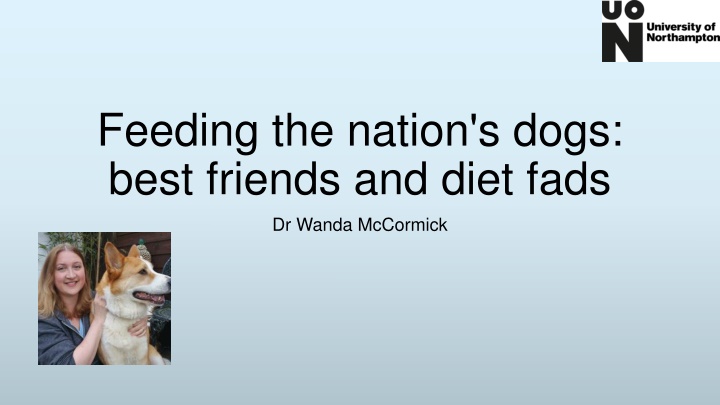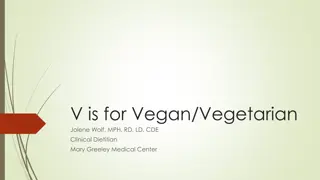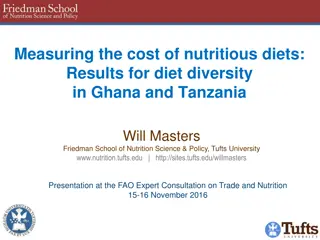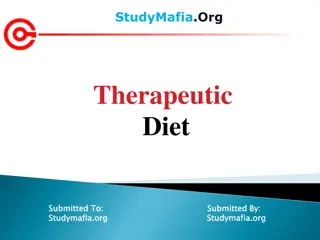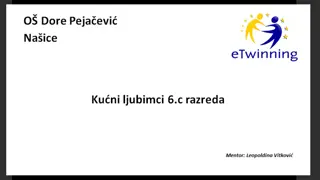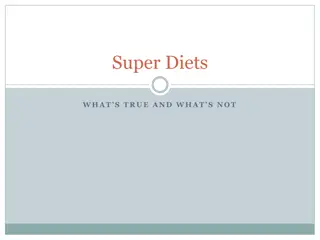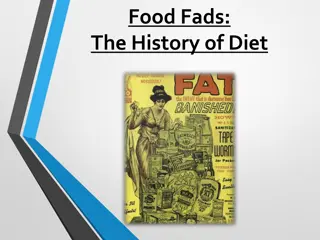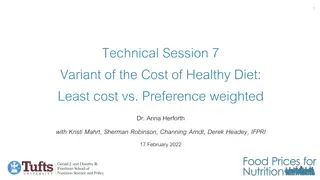Dog Diets in the UK: Trends and Influences
Investigating dog diets in the UK, this study explores the types of diets fed to dogs and the impact of human diet types on them. The research delves into reasons behind choosing specific diets, utilizing a questionnaire distributed via social media and promoted by the BBC. Results show a variety of responses, with a focus on vegan, vegetarian, and omnivore diets for dogs.
Download Presentation

Please find below an Image/Link to download the presentation.
The content on the website is provided AS IS for your information and personal use only. It may not be sold, licensed, or shared on other websites without obtaining consent from the author.If you encounter any issues during the download, it is possible that the publisher has removed the file from their server.
You are allowed to download the files provided on this website for personal or commercial use, subject to the condition that they are used lawfully. All files are the property of their respective owners.
The content on the website is provided AS IS for your information and personal use only. It may not be sold, licensed, or shared on other websites without obtaining consent from the author.
E N D
Presentation Transcript
Feeding the nation's dogs: best friends and diet fads Dr Wanda McCormick
Background Vegan Society (2016) stated 540,000 vegan (less than 1%), 1,684,000 meat-free (2.5%) in UK. Dogs are a subspecies of the grey wolf but up to 100,000 years of domestication has caused changes to digestive system. Up to 5 times better at digesting starch (Axelsson et al., 2013) with different microbiome (Lyu et al., 2018). Very limited published work on meat-free diets for dogs. Kienzle & Engelhard (1999) - 86 vegetarian dogs in Germany, Switzerland and Belgium; over 50% of the dogs were fed diets deficient in protein, essential amino acids, calcium, zinc and vitamins D and B12. Dodd et al. (2019) 3673 pet owners in Canada; 1.6% fed vegan diets (all bar 1 vegan themselves).
Objectives To identify the types of dog diets being fed in the UK (according to primary protein source grouping). To determine if human diet type influenced the diets being fed to dogs in the UK. To explore the reasons owners in the UK give for choosing their dog s diet type.
Methods Questionnaire produced using Qualtrics, run past small pilot group, and approved by UoN Faculty Ethics Committee and BBC. 6 questions: How would you describe YOUR diet? What is the breed of your dog? What is the age of your dog in years? What type of diet do you normally feed your DOG? How do you normally source most of your dog's diet? Why did you decide to feed your DOG this way? Distributed widely via social media and promoted by the BBC s The ONE Show. Available from 26/3/19 to 29/4/19. Data coded in Excel and analysed in SPSS.
Results 36535 responses cleaned according to consent questions, and any not completing dog diet questions, coding checked. n=33562 More vegans / vegetarians? Flexitarian Chickens Paleo Facultative carnivore Errors dog diets Figure 1. Responses according to human diet type.
Raw? Dog diets Figure 2. Responses according to dog diet type.
Dog diets Figure 3. Responses according to dog diet type (omnivore diets removed). Prey model raw / SARF / BARF? 9 people only 3 months
Figure 4. Responses for source of dog diet. Dog diets Relatively high proportion of homemade diets. Stockman et al. (2013) online recipes (maintenance); most would not meet NRC requirements, more deficiencies if written by non-vets. Oliveira et al. (2014) even those prescribed by vets are often not adhered to.
Human choice influences Highly significant association between owner diet and dog diet source, owner diet and dog diet, and dog diet and diet source (P<0.001 for all). 11.7% omnivore owners feed homemade vs 20.7% vegan owners. Of 2450 meat-free (vegetarian and vegan) owners, only 314 dogs were fed meat-free. 1% vegetarian owners fed their dogs as vegetarian but 33% vegan owners fed their dogs as vegan. Vegan dog diets twice as likely to be homemade as typical omnivore diets but fully carnivore ones actually three times more likely to be homemade (11.2%, 22.3%, 34.5%).
What makes people choose? Figure 5. Reasons for people choosing their dog s diet. Dog s health a priority. More people stated concerns about other diets than based upon vet advice. Expert opinion of breeders / rehoming charities.
What about dog health? Clearly important to owners! Interesting changes happening around complete vegan diets. Dogs cannot produce vit D. Plant-based diet unlikely to meet demands. Only legal additive now D3 (derived from lanolin) not vegan. Current project looking at company legislation compliance. Greatest concern about homemade diets 12.19% = 4090 owners. Information available is essential need to consider human aspects of diet choice much more, especially around social media.
What next? 443 respondents specifically stated diet choice based upon food allergy / intolerance sensitivity. (Many more mentioned grain- free, etc but without identifying an identified need). Diet intolerances very commonly discussed but very little published evidence. Some companies now promoting genetic testing but not validated. Likely most owners are diagnosing this problem but complicated by many things full range of nutrients in diet, storage mites, etc
Acknowledgements A huge thank you to Screenhouse Productions and the BBC s The ONE Show. All of the owners and their dogs!
